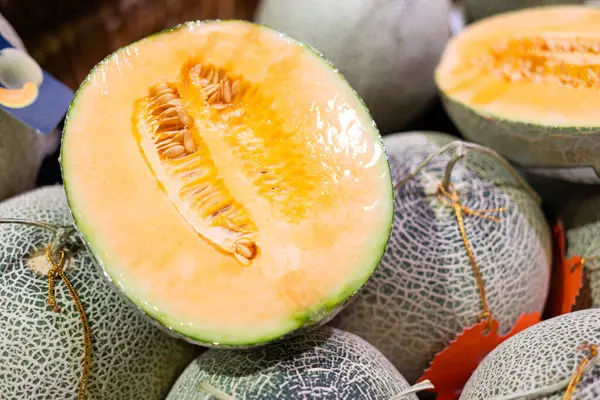The U.S. Food and Drug Administration (FDA) is urging consumers to refrain from consuming cantaloupe due to the potential for salmonella contamination. As of November 17, 2023, at least 43 individuals across 15 states have contracted salmonella, with 17 of those cases requiring hospitalization. The outbreak has been linked to a limited number of fresh cantaloupe and pineapple products sold by three brands: Vineyard, Aldi, and Malchita.

Recalled Products
The FDA has identified the following cantaloupe and pineapple products as part of the recall:
Malichita whole fresh cantaloupes labeled “Product of Mexico/produit du Mexique” and sold between October 16 and 23.
Aldi cantaloupe chunks and pineapple spears sold in clamshell packaging with best-by dates between October 27 and 31.
Vinyard cantaloupe chunks and cubes, fruit mixes, melon medleys, and cups containing cantaloupe. These products were primarily sold under the “Vinyard” label but may also bear the red “Fresh” brand. They were sold at Oklahoman stores from October 30 to November 10.
These recalled products were distributed to stores in Arizona, California, Florida, Illinois, Indiana, Kentucky, Maryland, Michigan, New Jersey, Oklahoma, Tennessee, Texas, Wisconsin, and Canada. However, additional retail distribution may have reached consumers in other regions.
Salmonella Infection Risks

Salmonella infections are more common than you might think. For every reported case of salmonellosis confirmed by laboratory testing, approximately 30 additional cases go unreported. The Centers for Disease Control and Prevention (CDC) estimates that salmonella causes over a million foodborne infections in the United States annually.
Symptoms of salmonella infection typically appear within six hours to six days of consuming contaminated food. These symptoms often include fever, abdominal cramps, and diarrhea. While most individuals recover within four to seven days, salmonella infections can be more severe for older adults and young children.
Salmonella Infection Complications
Dehydration
Diarrhea and vomiting are two of the most common symptoms of Salmonella infection. These symptoms can lead to dehydration, which can be serious, especially in young children and older adults. Dehydration occurs when the body loses more fluids than it takes in. Symptoms of dehydration can include dry mouth and throat, increased thirst, decreased urination, fatigue, and dizziness. In severe cases, dehydration can lead to seizures, coma, and even death.
Bacteremia
In some cases, Salmonella can enter the bloodstream and cause a serious infection called bacteremia. Bacteremia occurs when bacteria travel through the bloodstream to other parts of the body. This can lead to infections in other organs, such as the lungs, heart, and brain. Bacteremia can also lead to sepsis, a life-threatening condition that can cause organ failure and death.
Reactive Arthritis
Reactive arthritis is a condition that causes joint pain, eye inflammation, and urinary tract problems. It is thought to be triggered by certain infections, including Salmonella. Reactive arthritis typically develops weeks or even months after the infection. Symptoms of reactive arthritis can include pain, swelling, and redness in the joints, as well as eye pain, redness, and discharge. In some cases, reactive arthritis can also cause problems with urination, such as pain and burning.
Guillain-Barré Syndrome
Guillain-Barré syndrome is a rare but serious condition that can cause paralysis. It is thought to be triggered by certain infections, including Salmonella. Guillain-Barré syndrome typically begins with weakness and tingling in the arms and legs. This weakness can then progress to paralysis. In severe cases, Guillain-Barré syndrome can be fatal.
Precautionary Measures and Seeking Help
The FDA is actively investigating the ongoing salmonella outbreak linked to cantaloupe consumption. In the meantime, consumers should take the following precautions:
Do not consume any cantaloupe products.
Discard any cantaloupe products you may have in your possession, even if they appear unblemished.
Thoroughly wash and sanitize any surfaces or utensils that may have come into contact with cantaloupe products.
If you experience symptoms of salmonella infection, such as fever, abdominal cramps, and diarrhea, contact your healthcare provider immediately.
Please stay informed about the ongoing salmonella outbreak and follow the FDA’s guidance to protect your health and well-being.
Preventing Salmonella Infection
There are a number of things you can do to prevent Salmonella infection, including:
Cooking food thoroughly: Salmonella can be killed by cooking food to a safe internal temperature. Use a meat thermometer to make sure that meat, poultry, and seafood are cooked to the proper temperature.
Washing fruits and vegetables: Salmonella can also be found on fruits and vegetables. Wash all fruits and vegetables thoroughly under running water before eating them.
Handling raw meat, poultry, and seafood safely: Do not let raw meat, poultry, or seafood come into contact with other foods. Wash your hands thoroughly after handling raw meat, poultry, and seafood.
Avoiding cross-contamination: Cross-contamination occurs when bacteria are transferred from one food to another. To prevent cross-contamination, use separate cutting boards for raw meat, poultry, and seafood.
Keeping your kitchen clean: Wash your hands often when preparing food. Wash countertops, cutting boards, and utensils thoroughly after each use.
By following these precautions, you can help to reduce your risk of Salmonella infection.









